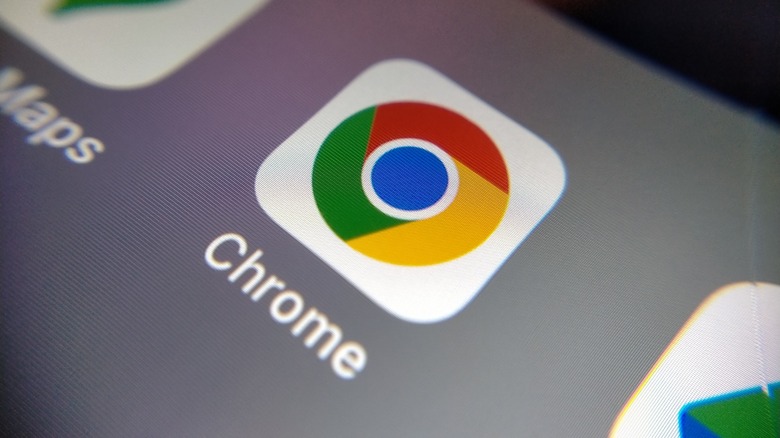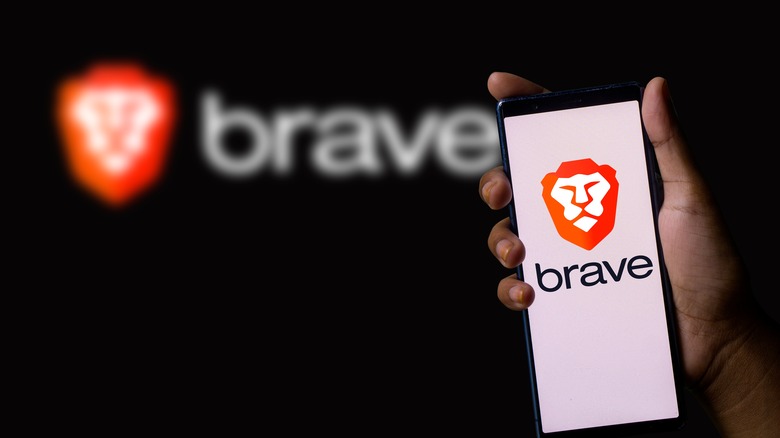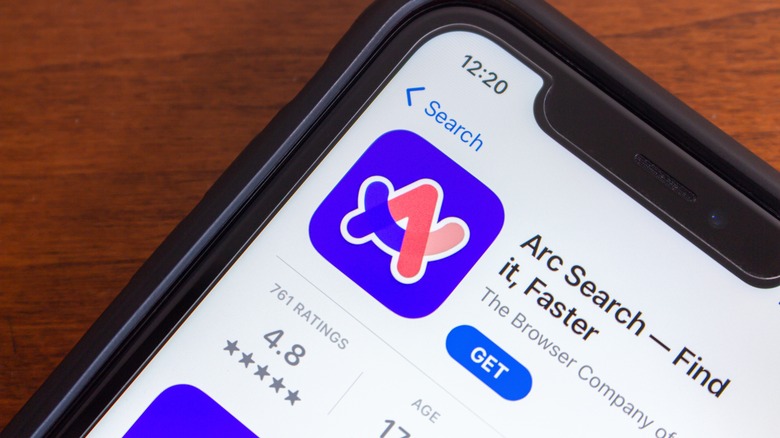The 7 Most Popular Google Chrome Alternatives For macOS
Google Chrome is one of the most widely used browsers worldwide. In 2022, over 56% of people said they use Google Chrome as their primary browser, and for good reason. Since its debut in 2008, the developers of the browser have worked tirelessly to keep the browser up-to-date and user-friendly. The browser is equipped with incredible features including password auto-fill and profile syncing, which are some of the many reasons people stick with Chrome to this day. If you frequently use Google services like Drive and Gmail for work, education, or personal use, it makes sense to use Google Chrome as your default browser, too.
Every browser comes with its own pros and cons, and when it comes to Google Chrome, you'll quickly realize that using it as your daily driver has its downsides. For example, Chrome is often criticized for sucking up a significant amount of energy off your computer. That's particularly frustrating on Mac computers, where browsers like Apple's Safari are designed with battery life in mind.
While Chrome's developers have been directing their efforts toward making the browser more energy-efficient, they still have a ways to go. This can quickly become an issue, especially if you tend to have multiple tabs open. Fortunately, there are multiple popular alternatives you can use instead of Google Chrome on your Mac.
Safari
There's a joke in the tech world that most Mac users have only opened Apple's Safari browser in order to download Google Chrome. If that's you, it's ok. But it's worth considering that Safari is still one of the best browsers to use on a Mac.
There are many reasons, the first of which being Safari is developed by Apple, which means it's optimized for macOS. It comes pre-installed on every Mac, so you don't have to worry about setting it up either. Generally, developers consuming find that Safari eats up less CPU and memory than its competitors, translating to faster performance and a noticeable improvement in your daily workflow, especially if you frequently switch between tabs.
If you dig a little further, you'll learn Apple's Safari offers Google Chrome-like features too, including bookmark syncing, private browsing mode and profiles. As someone who recently switched to Safari after years of using Chrome, I also noticed that Safari has many customizable options.
If you're deep into the Apple ecosystem and use multiple Apple devices like an iPad and iPhone, you can also enable iCloud sync for Safari. This way, you can access and control your open tabs across all your devices, among other useful features.
Mozilla Firefox
Mozilla Firefox is one of the oldest-running web browsers, offering a strong alternative to Google Chrome. Unlike Chrome, Firefox is an open-source browser. This essentially means that you can view, audit, and modify the browser's code as you see fit, as long as it doesn't violate their license policy. This open-source nature makes Firefox popular among developers.
Another thing that Mozilla Firefox apart from other browsers is its emphasis on privacy. It's long been considered one of the most secure web browsers out there, and it's packed with privacy-focused features like tracker blocking, a built-in password manager, and an ad-blocker. It also has a secure private browsing mode that actually seems to work, unlike Chrome's poorly named incognito mode.
Even though Firefox is a different product, it still looks a lot like Chrome, which makes switching rather easy. You can also add popular browser extensions to Firefox like Grammarly, Dark Reader, and more, to enhance your browsing experience just like you can on Chrome. Some extensions that you'll need to download on Google Chrome like Pocket are built into Firefox as well!
All in all, if you're looking for a browser that doesn't differ much from Google Chrome visually yet is more transparent about the data it collects, making it a worthy alternative to consider.
Microsoft Edge
Remember the good old days when Microsoft's Internet Explorer was the default and most widely-used browser on the internet? Just kidding. Before Google Chrome became a hit, Internet Explorer was one of the most widely used browsers, and it unfortunately had many security problems that ultimately led to its downfall.
As more advanced browsers like Firefox entered the market, Microsoft decided to retire Internet Explorer in 2022. While Microsoft gave up on its long-running browser, it wasn't done building web technologies. Today, the company offers a new browser called Microsoft Edge. Released in 2015, Edge is Internet Explorer's successor and is packed with features that you won't find on Google Chrome, such as advanced tab management and Microsoft app syncing.
Microsoft's own AI-powered chatbot, Copilot, is also integrated into Edge, which is a great advantage if you rely on AI for a lot of your tasks. While the browser is designed primarily for Windows, you can also download and use it on macOS. If you're deeply embedded in the Microsoft ecosystem, exploring Microsoft Edge and its features might be a worthwhile look.
Opera
Similar to Mozilla Firefox, Opera has set itself apart as a browser that prioritizes your security and privacy. Opera comes with a built-in Adblocker that the company says uses complex algorithms to block pop-ups and video advertisements from disrupting your browsing experience. The ad blocker also blocks website trackers to protect your privacy.
Opera also features a VPN built into the browser itself that is free to use. So, instead of looking for a secure VPN extension or service to download or pay for, all you need to do is toggle on a switch to make your browsing experience safer.
The ability to download extensions on Google Chrome is one reason many people use the browser, despite its performance issues. Luckily, one functionality that might make your transition from Google Chrome to Opera easier is that it works with Google Chrome's webstore, allowing you to download and install Chrome extensions.
In addition to being more energy efficient and safer than Chrome, Opera's interface may appeal to you too. As soon as you launch the app, you'll notice that it features a vertical side bar that contains applications like WhatsApp and Facebook Messenger. Opera gives you a lot of control over customizing this sidebar, adding AI services like Opera's AI, Aria, ChatGPT, and ChatSonic, as well as instant messaging applications like Telegram and Instagram for quick access.
While the interface looks quite similar to Google Chrome otherwise, Opera's vertical sidebar could help you improve your workflow.
Brave
Following in the footsteps of Opera and Mozilla Firefox, Brave is another browser that promotes itself as a more secure way to browse the web. One of its standout features is Shields, which blocks ads and trackers, helping it to draw a lot of attention, particularly in the ad-blocking community. Brave also says it upgrades all connections to HTTPS, providing more secure communications.
What also helps Brave stand out is its flexibility, giving users detailed control over privacy and security settings. Additionally, since Brave is based on Google's open-source Chromium browser technology, it works with many of the same extensions you may have used on Google Chrome. So, if you've been sticking with Google Chrome for its extensions, transitioning to Brave will be much easier.
Like Google Chrome and other browsers, Brave offers a secure private browsing mode. A unique aspect of Brave's private mode is its integration with the privacy-focused surfing service, Tor. Browsing the web via Brave's private mode with Tor should help to obscure your identity from any website you visit.
Arc
Arc is one of the latest and most innovative browsers to hit the market. Developed by The Browser Company, Arc was released to the public last year with a mission to build a better way to browse the internet.
One difference with Arc is its sidebar, which has icons for "apps," sites or services you frequently use. Tabs also live in this sidebar, rather than the top as in most browsers. Similar to a few browsers on this list, Arc also offers a built-in ad blocker. Arc is also based off Chromium, so you can use almost all extensions from Chrome as well.
Another of Arc's standout features is its Spaces option, which allows you to create different experiences based on different tasks. You can have a space for work, for example, that has your related apps and tabs open. Then, if you need a break, you can switch to a personal space, which can have different apps and tabs.
While it may take you a while to adjust to Arc's sidebar-focused interface, the browser is great if you're looking to ramp up your productivity and prefer a cleaner, and minimalist interface.
Tor
More commonly associated with the dark web, Tor (The Onion Router) is a free open-source web browser. Its claim to fame is its promise that you can effectively browse the internet anonymously through its service. The way Tor works is that when you surf to a site, the data is routed through different "nodes," or relays in other parts of the world, before it gets to you. Tor relays are maintained by volunteers, who look to the service to help people living in repressive countries more easily access information. Unfortunately, while Tor is regarded to be more secure than Google Chrome, the way it anonymizes your information ultimately slows down your browsing experience.
Unlike Chromium-based browsers that support most Chrome Web Store extensions, Tor is quite limited. In short, if you're looking for a browser that provides the ultimate experience and doesn't compromise on performance, we'd advise you to go with one of the other alternatives in our list. However, if your biggest concern is privacy and you don't mind waiting a couple of extra seconds for a site to load, we recommend giving Tor a shot.
Why these apps made it to our list
When shortlisting browsers, we ensured to include those with a wide base of satisfied users. We focused on browsers with a reputation for safety and features that make them stand out from one another. Once we shortlisted a few browsers, we tested them out to ensure they live up to their hype. I personally switched from Google Chrome to one of these browsers after years of being loyal to Google Chrome, and I have zero regrets!








